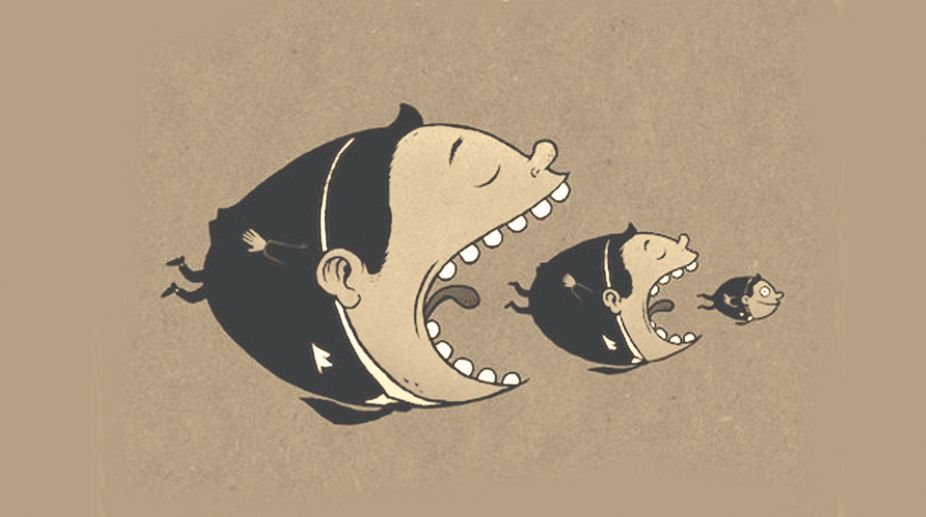Efforts on to make India world’s food basket: Shivraj Chouhan
The Union agriculture minister called on the researchers not confine their work to the lab but extend it to the farmers.

CAPITALISM
Politics is the use of power in society. Political evolution is when the use of power becomes inclusive and benefits everyone fairly. Have human societies evolved so over time? For long, there was actually a reversal. Early hunter-gatherer societies were usually politically inclusive but unproductive.
Barring a few inclusive regimes, the move to tribal, agrarian and industrial societies enhanced productivity but also political hierarchy for several millennia where elites exploited their own people. This trend was broken only recently once advanced democracy emerged in the West and politics became more inclusive there. This highlights political evolution’s slow pace.
Advertisement
The copy-paste brigade may like to know how this change in the West occurred so that we could quickly copy the recipe. Unluckily, history’s answer here is not copy-friendly. When do elites stop exploiting their own? They do so when they find aliens to exploit.
Advertisement
So, Western economic and political progress was hugely underpinned by colonialism. It was no longer critical to exploit your own non-elites, who became partners in crimes abroad. Scientific prowess played a major role in Western progress too.
While Western history may extol the great leaders who gave equitable politics, it actually came less from lofty morals and more from capitalism’s economic needs. As economies flourished, an equitable domestic political system became an economic necessity, but not so an equitable global political system. So, we have the odd spectacle of advanced democracies perpetuating inequitable global politics as this suits their economic needs.
Developing states subscribe in theory to the same ideals of equitable rule. But in practice, their politics remains elitist as they are mostly riven by internal vertical and horizontal divisions and also function in an inequitable global economic and political system run by powerful states. This limits their scope for progress.
Hobbled by internal and external obstacles and condemned to producing low-end goods for their own economy and the global economy, the politics of such states remains rapacious.
Producers in pre-capitalist sectors there, e.g. agriculture, obviously exert strong pressure against good governance to maximise their profits by exploiting workers and suppliers. But even producers in capitalist sectors there, e.g. industry, exert similar pressures as they produce low-end goods where high profits only come from breaking laws. So, capitalism in such societies perpetuates pre-capitalist political patterns as it inserts them into the global capitalist system in low positions.
During colonialism, most colonies were exploited. But a few became settler colonies where the physical climate was like back home, e.g. the US. These prospered once the locals were eliminated. The same is true under neo-colonialism today.
Global capital travels to most developing states to exploit loose rules and often funds sweatshops which encourage local misrule. But a few become ‘settler’ capitalist host economies where the political climate is like back home, e.g. nation-states in East Asia, and internal strife is low. They thus represent safer abodes for higher-end capitalist production. Their economies and politics thrive.
The example of such states becomes powerfully seductive for other poor states. It creates the illusion that they too can progress rapidly by being honest and hardworking and following neo-liberal policies. In reality, such progress remains impossible for most.
Thus in Africa and South Asia there has been little political evolution over the years given stagnant economies. Parties, parliament and executive in Pakistan largely benefit the powerful, and political evolution is painfully slow. The same is true elsewhere in South Asia, even India. In fact, on many aspects, such as the quality of political parties, one even sees reversals, e.g. with Congress, the BJP, PML and the PPP. Even the PTI and the Aam Aadmi Party, the hopes of impatient middle classes, succumb to the same pressure and soon absorb status-quo persons and practices.
The result is sleaze, misrule and dynasties, the scourge of both conservative and liberal reformers. Conservative reformers aim to end these evils through moral crusades, that is by trying to influence the morality of individual wrongdoers, failing which by hanging them. But they fail to link these evils to the working of national and global economies. Liberal strategies do so and revolve around class struggles rather than individual morals. In some places, liberals have had some success compared with the universal failure of right-wing moral crusades.
But even liberal struggles can’t yield quick and major successes given the powers of national and global economic elites. This is not to suggest that one should give up but that one should be mentally prepared for a long and hard slog.
Dawn/ANN.
Advertisement